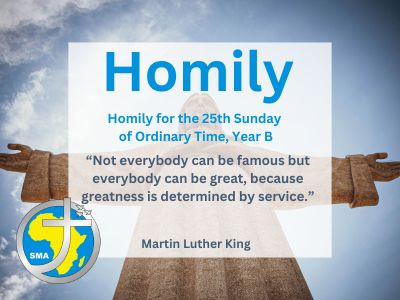Readings: Wis 2:12,17-20; James 3:16 – 4:3; Mk 9:30-37
Theme: True Greatness
The theme of today’s readings might be summed up in these words of Martin Luther King: ‘Not everybody can be famous but everybody can be great, because greatness is determined by service.’ Ambition, drive, success and winning have been dominant traits of humanity from time immemorial. There is, of course, nothing wrong with the drive to succeed in life, to be the best we can be in our chosen area of endeavour. Without that drive, we would not have a Rhys McClenaghan, a Daniel Wiffen or a Nellie Harrington, and we would not be thrilled and inspired by their achievements. St Paul, who was quite a driven character himself, urges us to aim high: ‘Be ambitious for the higher gifts’ (1 Cor 12:31).
Ambition in itself is not bad. It is what often accompanies it that make it dangerous and destructive. As St James reminds us in today’s second reading: ‘Wherever you find jealousy and ambition, you find disharmony, and wicked things of every kind being done’ (James 3:16). The popular signer and song-writer, Ed Sheeran, who has won multiple awards for his songs, spoke of the toxic atmosphere of the MTV Awards ceremony in New York. He stated that he no longer enjoys these events (and he has been to a lot of them!) because, and I quote, ‘the room is filled with mutual resentment and hatred, and it’s a pretty uncomfortable mood’. Ambition, even when directed to noble ends, needs to be balanced with, and accompanied by, other qualities like wisdom and kindness. Wisdom, in the words of James, ‘comes down from above,… makes for peace, and is kindly and considerate; it is full of compassion and shows itself by doing good’ (James 3: 17).
In today’s gospel passage from Mark, Jesus teaches us what it means to be truly great. He doesn’t say that we shouldn’t seek greatness, or try to be the best person we can be. But he turns the common understanding of greatness on its head: ‘If anyone wants to be first, he must make himself last of all and servant of all’ (Mk 9:35). This teaching doesn’t sit easily with us. It’s not the way the world thinks or works. People do not get ahead by making sure they are last in line. The instruction of Jesus has nothing to do with human wisdom. It makes sense only from the perspective of God’s way of judging persons and situations, that is, from the perspective of the Kingdom of God.
Mark sets out the context of Jesus’ teaching in stark terms. He tells us that the disciples of Jesus had been arguing about who among them was the greatest. Despite the repeated reminders of Jesus that he was destined to be rejected by the Jewish authorities, and to suffer and die before rising again, they were still thinking of his kingdom as an earthly political realm with themselves holding positions of power and prestige. When Jesus asks them what they had been discussing as they walked with him on the road, they fall silent! Clearly ashamed of themselves, they are unable to speak their minds. Foolish and blind as the disciples of Jesus were, and as we often are, Jesus was patient with them and takes time to instruct them about what greatness means in the context of kingdom he is inaugurating through his suffering, death and resurrection. It means placing ourselves and our talents at the service of others and of God’s reign of justice, peace and love on earth.
Jesus illustrates his teaching about greatness by calling a small child to himself, placing this child in front of them and then identifying himself with those whom the child represents: ‘Whoever receives one such child in my name receives me; and whoever receives me, receives not me but the One who sent me’ (Mk 9:37). When I was a child I was sometimes told by my Granny, especially when I was playing with my brothers and being a bit noisy, that children were to be seen not heard. Yet, for Jesus, children are to be seen, heard, welcomed and imitated. They are the gateway to the kingdom. The values of the kingdom are most clearly manifest in children who are small, vulnerable, trusting and defenceless. When we welcome them and learn from them, and from all the little ones of our world; when we enter the world they inhabit, letting go of our desire to be big and important, we become servants and agents of God’s kingdom. And thus we become great in God’s eyes. Such service is not drudgery or slavery, but liberating and joyful, for it makes us children of the kingdom. I will conclude with a poem about service by the American poet, Frank Otis Erb.
It is entitled, Serve Where You Are.
That noble future you so fondly dreamed;
That service which on life’s horizon gleamed;
That influence far-reaching in its scope;
That great success on which you set your hope.
And now the door is closed, the gate is barred?
What then? Repinings? bitterness? a heart grown hard?
Nay! Nay! Serve where you are.
And as you share your best with others, lo,
Slowly above your leaden rim will glow
A nobler future than you dared to dream,
A service broader than youth’s fondest gleam,
An influence heaven-reaching in its scope,
Success more brilliant than your dearest hope,
O heart! serve where you are.
Listen to an alternative audio homily from Fr Tom Casey SMA.

